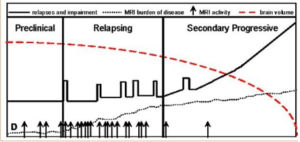Authors
Roz Kalb , Psychologist & John Schafer , Neurologist
Close

2 Aug 2021 | ~5:48 Engagement Time
Because multiple sclerosis changes over time and affects so many areas of a person’s health, getting the right healthcare treatment means getting comprehensive care.
Comprehensive MS care is an approach to healthcare that accounts for the stages of MS, its impacts on your overall health, and all the people involved in helping you live well and stay healthy.
This article answers:

Understanding the symptom course in MS is the first step to understanding the components of comprehensive care. This diagram illustrates the three stages of MS:
In this stage, no relapses—also known as exacerbations or attacks—have occurred yet. This is indicated by the solid black line. During this period, MRIs may show the beginnings of disease activity in the central nervous system, as indicated by the black arrows. The dotted line shows the “burden of disease,” which refers to the accumulation of MRI lesions in the brain. Brain volume loss or “shrinkage,” as indicated by the red (dashed) line, has not yet begun.
Relapses occur during this time, indicated by the rising and falling black line. For many people, it’s possible to come to a complete recovery following some relapses. For others, there may be only partial recovery from a relapse and some impairments may be permanent.
MRI activity, indicated by the arrows, increases.
Brain shrinkage (also referred to as “atrophy”) — which refers to the loss of brain cells — begins in this stage. This loss is indicated by the downward slope of the red line. Although all of us experience brain shrinkage as we age, the process can be accelerated in people with MS.
The greatest amount of inflammation is occurring in the central nervous system during the Relapsing phase of MS, which is why starting a disease-modifying therapy early is so important.
Over time, inflammation in the central nervous system can decrease, so the number of relapses decreases, and the evidence of disease activity (new lesions) on MRI also decreases.
At the same time, disability may increase, and loss of brain tissue (shrinkage) may continue even though the MRI scan shows no new lesions.
Younger people are more likely to have relapsing MS while older people are more likely to have progressive disease. These changes over time are largely due to age-related changes in the way the immune system functions.
As seen in the graph, the disease process is different between the two phases. In the early phase, attacks of new symptoms and new MRI lesions occur. In the later phase, progressive worsening of disability occurs even without any attacks or new MRI lesions.
The five components of comprehensive MS care cover all the ways the disease behaves over time:
The first and most important step your doctors will advise upon diagnosis is early and ongoing treatment with disease-modifying therapy.
From that time forward, you and your doctors will monitor the effects of treatment to determine whether your therapy goals have been achieved. If a DMT is not preventing attacks or new symptoms and new lesions on the MRI scan, you and your provider should discuss changing medications and work together to find the right one for you.
When a relapse occurs, certain interventions or medicines might be needed to help you through it, for example, corticosteroids may be given to reduce inflammation and help bring the relapse to an end more quickly.
Following a relapse, many people then begin rehabilitation to enhance their recovery and regain any functions that were impacted. Rehabilitation might include physical therapy, occupational therapy, and/or cognitive rehabilitation.
MS symptoms are unpredictable and varied, so managing them will be the ongoing challenge of your life with MS. Lifestyle changes, rehabilitation therapies, and medications will all be considerations to help you manage your symptoms.
There are many types of rehabilitation, such as physical therapy, occupational therapy, speech therapy, and cognitive rehabilitation. Mood management interventions are important for addressing common MS symptoms such as anxiety and depression.
Since MS might take a toll on your body over time, there are ways to optimize your physical functioning to keep you active and enjoying the things you love. This rehabilitation may be physical therapy, to help with mobility challenges and exercise programs.
It may be occupational therapy, to help with task simplification, mobility aids, home modifications, and energy conservation. Or you might seek speech/language therapy, which helps with speech, swallowing, language processing, and other cognitive challenges.
MS takes its toll on your mental health. Grief, depression, and other emotional challenges can weigh on you. Mental health professionals can help. Family and friends are your allies in the battle against MS! Turn to your support network to help you stay mentally strong.
The MS community is here to help you. When no one else seems to get it, turn to support groups and Can Do MS programs to be with people who understand.
This diagram shows all the players on the comprehensive MS Care Team

You and your support partners are at the center of the team. No one knows your body like you do, and your role will often be to speak up about your experiences and advocate for your needs.
Surrounding you are all the team players working to help you thrive with MS. The blue circle contains the core members of your team – the Neurologist, MS Nurse, Physician Assistant or Nurse Practitioner, and your Primary Care Physician.
The green circle contains all the other healthcare professionals who may help you along the way, depending on your symptoms and needs. These include rehabilitation professionals, mental health professionals, pain management specialists, your pharmacist, and urologist/gynecologist.
Some people live in areas where they can find all of these providers in one place at an MS Comprehensive Care Center. Others need to assemble their own team by identifying providers in their communities to help them manage different aspects of their MS.
Even if you don’t live near an MS Center, you deserve the highest level of care and expertise. Telehealth might be a great option, or you can find a balance with traveling to see certain MS specialists.
For example, you might see an MS-specialized neurologist who is located farther away just once a year. Throughout the year, you can see your local primary care physician and rehab specialists more frequently. In this example, it’s important to encourage your doctors to communicate with one another, which keeps your MS neurologist involved and informed.
You can identify MS providers in your area on the National MS Society website or call 1-800-344-4867 to request a referral from one of the Society’s MS Navigators.
Whether you visit a comprehensive MS center or create your own team, your job is to advocate for yourself. Remember, you’re at the center of your care team.
Ask providers to exchange records and communicate with one another Here are some key resources to help you access the care you need:
National MS Society, which can direct you to:
Keep Learning